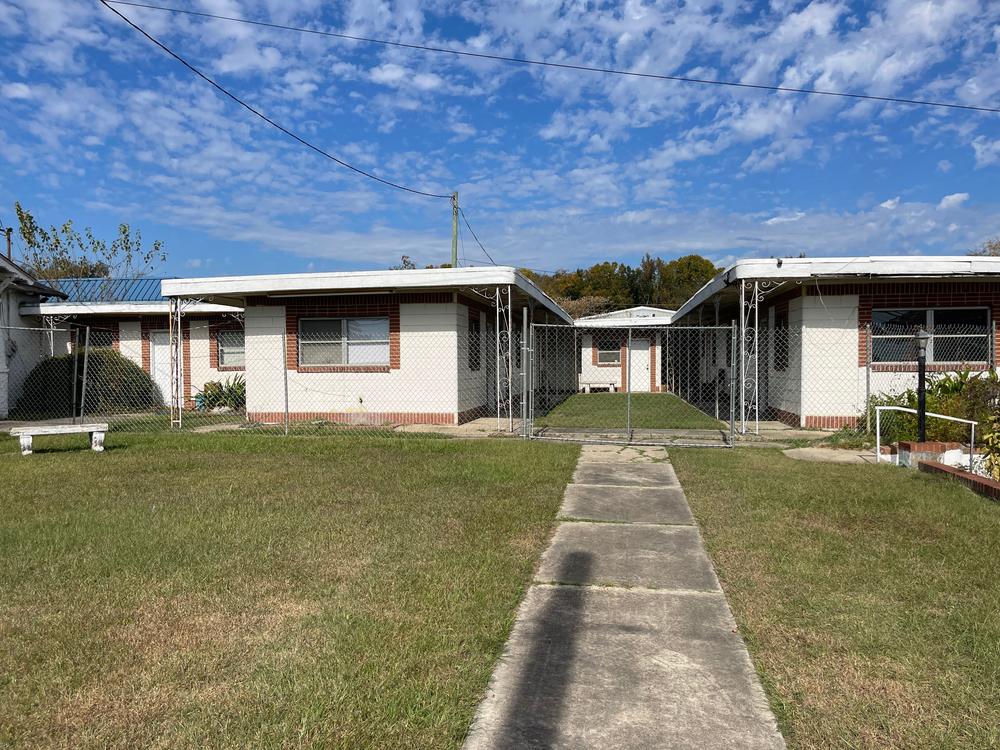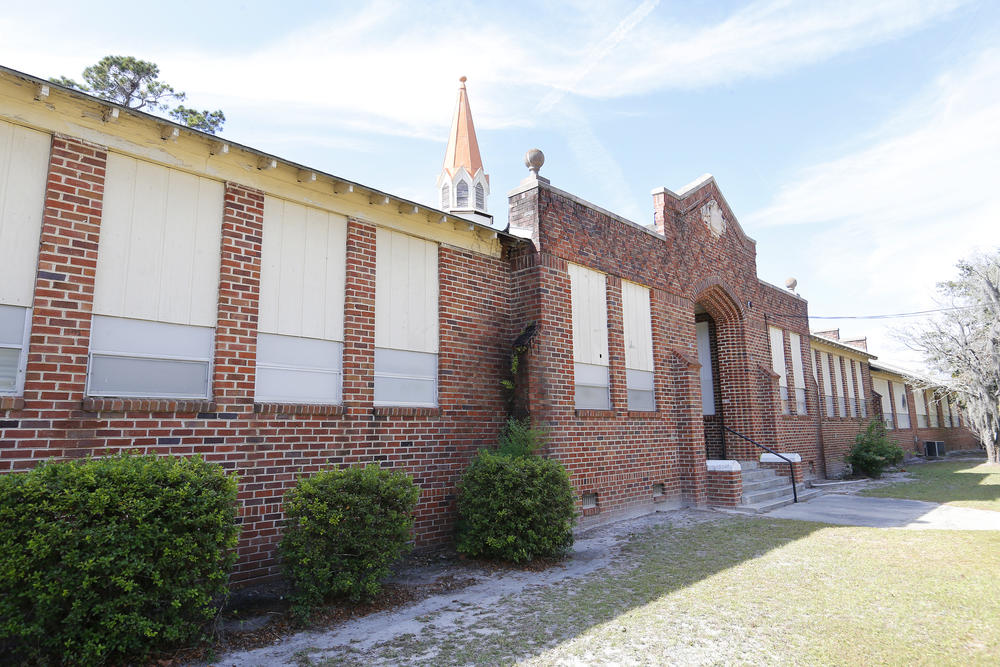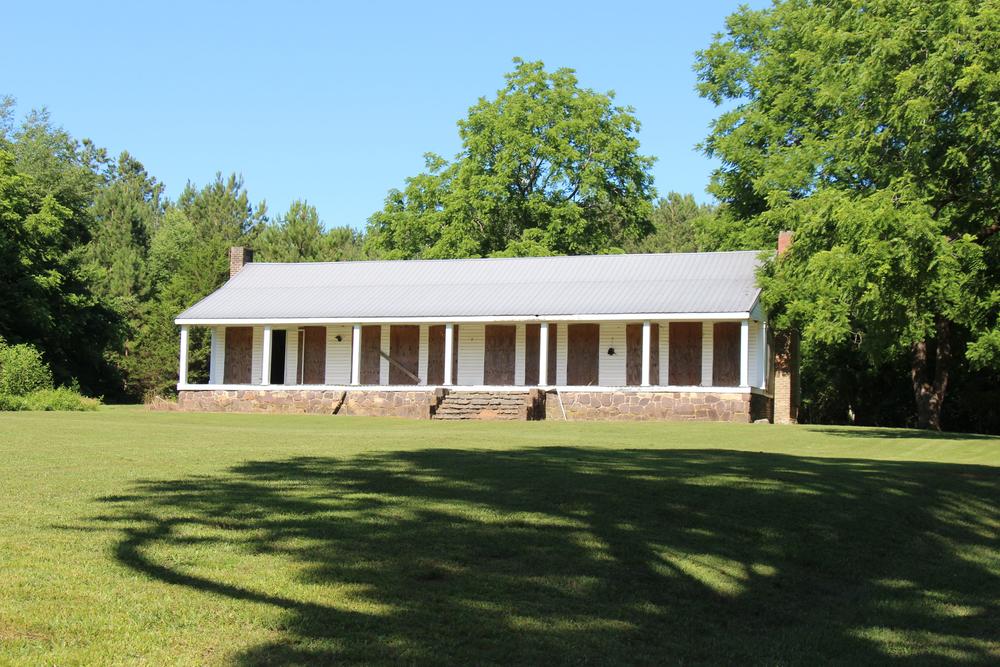
Caption
The Dudley Motel was opened in 1958 to accommodate Black travelers during the tumultuous civil rights era.
Credit: Georgia Trust for Historic Preservation

The Dudley Motel was opened in 1958 to accommodate Black travelers during the tumultuous civil rights era.
A 1958 Black-owned motel in Middle Georgia is among 10 historic sites listed among Georgia’s latest Places in Peril.
The annual list from the Georgia Trust for Historic Preservation prioritizes the organization’s work for the coming year and brings attention to threatened buildings.
The trust’s president and CEO, Mark McDonald, said the Dudley Motel in Dublin closed in the 1980s.
“It was listed in the Green Book,” McDonald said, referring to the mid-20th century publication used by Black travelers to safely navigate racially hostile regions of the country. “It’s now abandoned but it’s completely intact. It served Andrew Young and Martin Luther King Jr. as they traveled doing their civil rights work during that era. It’s really a time capsule.”
McDonald said that 85% of the buildings that have been listed as Places in Peril in previous years have been saved from demolition, although not all saved buildings are renovated.
In some cases, the most immediate goal is simply to stabilize a property.
That’s what McDonald said is needed on Atlanta’s storied Auburn Avenue, where a building once home to several 20th century Black businesses, including a branch office of the Atlanta Life Insurance Company, is approaching a state of demolition.
“Unfortunately, in 2008, the tornado that ravaged downtown Atlanta, including taking the roof off the Phillips Auditorium, damaged this building, too,” he said. “And it’s just been sitting there, without a roof.”
McDonald said that listing properties in such conditions shouldn’t bring “shame” upon them but, rather, economic opportunities.
“Historic preservation creates two jobs for every one job that new construction creates,” he said. “When you restore an older building, you’re not buying all-new materials. You’re paying labor to refurbish the existing materials.”
Here is the complete list of Georgia’s 2022 Places in Peril, as provided by the trust:
A contributing property in the Sweet Auburn National Landmark District, 229 Auburn Avenue has been home to several Black businesses during the 20th century, including a branch office of the Atlanta Life Insurance Company.
In March 2008, a tornado damaged several buildings in the district adjacent to 229 Auburn Avenue. The former Atlanta Life Insurance branch office still stands, but it has been vacant for years and was identified by a National Park Service study as the most imperiled building in the Sweet Auburn District.
The Beulah Grove Lodge No. 372, Free and Accepted Masons, was built around 1910 as the brainchild of freedman Jack Smith, who provided the land for a masonic lodge and school for Douglasville's Black community. Owned by the neighboring Pleasant Grove Baptist Church, the building has not been in regular use for almost four decades.
Beulah Grove Lodge and School stands as an important piece of history in the Jim Crow South. Due to its infrequent use, the lodge has deteriorated to a dangerous state and rehabilitation efforts have been complicated by the pandemic.
Chickamauga Lodge No. 221, Prince Hall Affiliate of the Free and Accepted Masons, was organized in 1916 by former enslaved and first-generation freed Black Americans. The current building was completed in 1924.
Immediate needs include a new roof and structural evaluation. The interior and exterior of the building need repair. Now cared for by local Masons from other regional lodges, the building remains an important space for the Black community in Chickamauga.

The former Dasher High School continues to serve the citizens of Valdosta as a community center. However, parts of the building, particularly the auditorium, are unsafe for the public.
The former Dasher High School was built in 1928 as the third public high school for Black students in Valdosta, and it is the only remaining school building from that era. Several prominent leaders of the Valdosta community graduated from Dasher, including writer and journalist Louis E. Lomax, the nation's first Black television journalist. Today, the Coastal Plain Area Economic Opportunity Authority uses the building to provide services to low-income households.
Dasher High School continues to serve the citizens of Valdosta as a community center. However, parts of the building, particularly the auditorium, are unsafe for the public. Involved partners hope to preserve this part of Valdosta's Black legacy by restoring Dasher High School and utilizing it to better serve its residents.
Herbert "Hub" Dudley, a prominent Black business owner in Dublin, opened the Dudley Motel in 1958 to accommodate Black travelers during the tumultuous civil rights era. It was the first Black hotel in the area and was listed in Black travel guides such as the Green Book. Notable guests included Martin Luther King Jr. and Andrew Young. In addition to this 12-unit motel, Dudley also owned the nearby Retreat Cafe and service station.
The Dudley Motel closed in the 1980s and has been vacant since. Although it has been identified as a significant site with potential for heritage tourism, a preservation plan is needed to protect and rehabilitate the hotel, both for its cultural significance and mid-century architecture.
The earliest portions of Lee's Mill date to the antebellum period. Located along the headwaters of the Flint River, the mill was operated by a Clayton County pioneer family up until the death of its patriarch, W.L. Lee, in 1933. With the dominating growth of the nearby Hartsfield-Jackson Atlanta International Airport, the area near the mill has been zoned for heavy industrial development for decades.
The ruins are a small pocket of Georgia's rural past, tucked into the shadows of industrial expansion. As a result of such development, the Flint River experiences intensive floods due to runoff from the hard surfaces of the upstream airport and parking lots, eroding what remains of the mill's structure.
Built in the late 1830s as the homestead of Brig. Gen. and state Sen. Eli McConnell, the McConnell-Chadwick House was one of the earliest structures in Cherokee County. During this time, McConnell, also an enslaver, had been authorized to mediate conflict between Native Americans and white settlers in the area and to sell property after the 1838 Cherokee Removal.
The McConnell-Chadwick House, architecturally significant for its Greek Revival design, is unoccupied and threatened by rapidly expanding development. The preservation of this historic house has the potential to allow the public to understand a full history of the area, including McConnell's role in the forced removal of native Cherokee, white expansion through the land lottery system, and development of the area through local and state politics.
The Old Campbell County Courthouse, one of the last Greek Revival buildings constructed in Georgia, was built in 1871 and served as a courthouse until 1932, when Campbell County was annexed into Fulton County.
The courthouse had been vacant for two years when on Aug. 31, 2022, the building caught fire, requiring the fire department to punch holes in the roof and flood the structure with water. Members of the community hope to gather support to stabilize and rehabilitate this historic courthouse, using the opportunity to develop a plan to return the building to productive use.
The former Wilkes County Training School was established in 1956 as an Equalization School, combining roughly 40 rural Black schools in Wilkes County and teaching first through 12th grades of Black students. During integration in 1970, the previously segregated white high school was merged onto this campus and the ninth through 12th grades were renamed Washington Wilkes Comprehensive High School.
Vacant since 2011, the Training School is a vital resource in telling the history of Black public education. The building suffers from a lack of maintenance and deterioration. Residents hope to see Wilkes County Training School restored, used as a new space for the community, and recognized as an important piece of local heritage.

Originally constructed for Presley and Rachel Thedford Yates, this house is one of the few remaining antebellum homes in Catoosa County.
Originally constructed for Presley and Rachel Thedford Yates, this house is one of the few remaining antebellum homes in Catoosa County. Presley Yates received the land in the Cherokee Land Lottery of 1832, and the house was completed in the late 1830s, with later additions made in the early 1900s. Presley Yates served as a delegate to the Georgia Secession Convention in 1861 and voted against secession despite being an enslaver.
Because of the house's location next to a critical water source, which provides much of Catoosa County's water supply, public access and rehabilitation are not currently viable. The options for saving the Yates House may be limited, but the property owner, local historical society and community advocates are eager to preserve this early resource and its unique history.